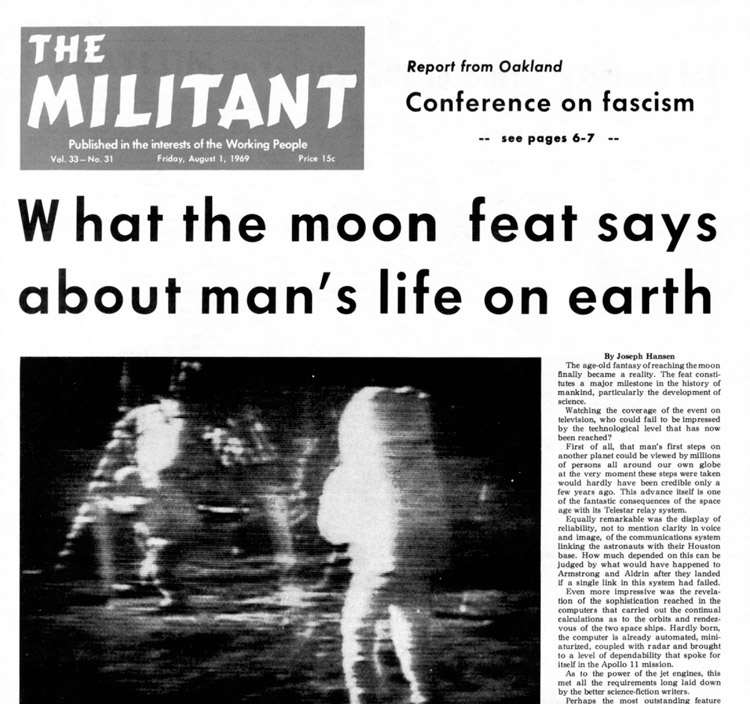All the daily big-business press — and discussions by workers in bodegas, ball games and barbecues — this week have touched on the 50th anniversary of the U.S. 1969 moon launch and Buzz Aldrin’s and Neil Armstrong’s walks there.
Of course the capitalist politicians and media use the anniversary to promote the prestige of U.S. imperialism and the idea that “we” were — and therefore must also today be — great and noble. It’s useful to remember that 1969 was a high point of U.S. imperialism’s bloody war against the people of Vietnam. And today the U.S. rulers’ capitalist system is in crisis and Washington is enmeshed in wars across the Middle East and in Afghanistan, and is threatening the people of Iran, Venezuela and Cuba.
And, by the way, there is no “we.” There are two main social classes in the U.S., the small class of capitalist rulers, with their larger cohort of meritocratic enablers, and the vast majority, the working classes and all others exploited and oppressed by the bankers and bosses.
Still, the tremendous advances for science that the trip to the moon and back were built on, are a fact. And what it showed about what the human race is capable of accomplishing when it is mobilized.
The lead article in the Aug. 1, 1969, Militant — pictured on this page — was written by Socialist Workers Party leader Joseph Hansen, and headlined, “What the moon feat says about man’s life on earth.” It says, “The feat constitutes a major milestone in the history of mankind, particularly the development of science.”
Hansen describes what tremendous advances were involved in communications, computerization, rocket science and in the mobilization of human labor it involved.
He explained, “An enterprise of the scope of this one — like the successful production of the atomic bomb — is beyond the capacity of private enterprise. Only a government could assemble 500,000 people, allot $24 billion, make available the resources of the Army, Navy, and Air Force in a concentrated effort of such breadth for almost a decade.”
He also pointed out that this didn’t mean “it was not a highly profitable business for the companies that got the contracts. An accounting on this would be highly revealing.”
Hansen described the immediate gains in scientific knowledge from the successful landing, what scientists would be able to learn about the moon, and therefore, about the origins of the earth.
‘Some sour notes’
Hansen pointed out there were “some sour notes” in the way the U.S. rulers organized the landing. “The first one was the planting of an American flag with gadgetry to hold it out as if it were streaming in the wind, thus making up for the moon’s deplorable lack of an atmosphere.”
This showed how Washington sought to “preserve the traditions of [Queen] Isabella of Spain and her kind, who always had the explorers they outfitted put up the imperial flag as their first official act on landing. The reminder was no doubt,” Hansen said, “appreciated throughout the colonial world, particularly in Latin America.”
He pointed out that in their hurry to win the “race” to the moon, many scientists at the time warned Washington had tossed aside important precautions, like avoiding possible contamination of the surface.
In fact, from 1959, when the Soviet Luna 2 was deliberately crashed into the moon, to today, 65 rockets have been sent to the moon, leaving some 800 objects behind. This includes crash debris; over 600 rovers, cameras, sensors and other gear from experiments; and personal objects like U.S. flags, photographs, two golf balls and up to 90 bags of urine, feces and used wet wipes.
“The men who decided on the space program are not primarily interested in science,” Hansen explains. “They are interested in the tie-up between the space program and the arms race.
“From their standpoint the ultimate payoff in successfully landing men on the moon is the still higher destructive capabilities that will accrue to the American war machine.”
Hansen pointed to the obvious connections between this fact and the U.S. war in Vietnam. “The country capable of the technological feat of putting men on the moon was the same country displaying its technological prowess in burning babies with napalm!”
And he quoted Lewis Mumford, noted sociologist and historian, who wrote in the New York Times, “In order to achieve both military power and economic ‘prosperity’ and support the power elite and their factotums in the style to which they are accustomed, every other human enterprise must either be trimmed to meet their needs or abandoned.”
Mumford pointed to the fact that the effort to bring off the moon landing coincided with government cuts in education, hospital services, libraries and museums, defilement of the environment, “to say nothing of many other evidences of gross social failure and human deterioration.”
This February the president and the Pentagon formally established the U.S. rulers’ newest military branch — the Space Force — to plan for battle in outer space.
The most important result?
“Another consequence is much more encouraging,” Hansen wrote. “The demonstration that it is possible to land men on the moon is certain to greatly increase sentiment in favor of ending capitalism and advancing to socialism.
“Why can’t similar organization and scientific knowledge be applied to make our everyday lives more secure and livable? If we can go to the moon, why can’t we assure food for everyone? Provide decent housing? Adequate medical services? Guaranteed yearly incomes? An end to war?”
“Before too long science may thus have its revenge on those who have diverted it to inhuman ends,” he said, “to profit-making at the expense of human needs, to mass murder, to the construction of fiendish weapons of exterminating mankind.”
“The most important feature of the Apollo 11 triumph may yet be the impact it has on bringing man, the tool-making animal, to realize that he has become sufficiently skilled with tools, and that now he must master his social and economic relations if he is not to perish from what the tool has become.”
Today some of the richest of the rich — off our backs and our labor — have raked in enough profits to launch their own for-profit rocket businesses. The world’s richest person, Amazon owner Jeff Bezos, has his Blue Origin space tourism company, and tech guru Elon Musk his SpaceX venture. Richard Branson’s Virgin Galactic, which has yet to successfully put a rocket in the air, has 680 people with money to burn signed up on its travel list, having paid a deposit of $200,000 each.
But, as Joe Hansen indicates, working people increasingly see that it will only be when we conquer what we are capable of — of uniting working people together and fighting for a new world, transforming ourselves in the process — that we can conquer political power, a workers and farmers government.
And, as we use that power to transform the planet and eliminate want, we’ll also reconquer science and begin reaching to the stars.


